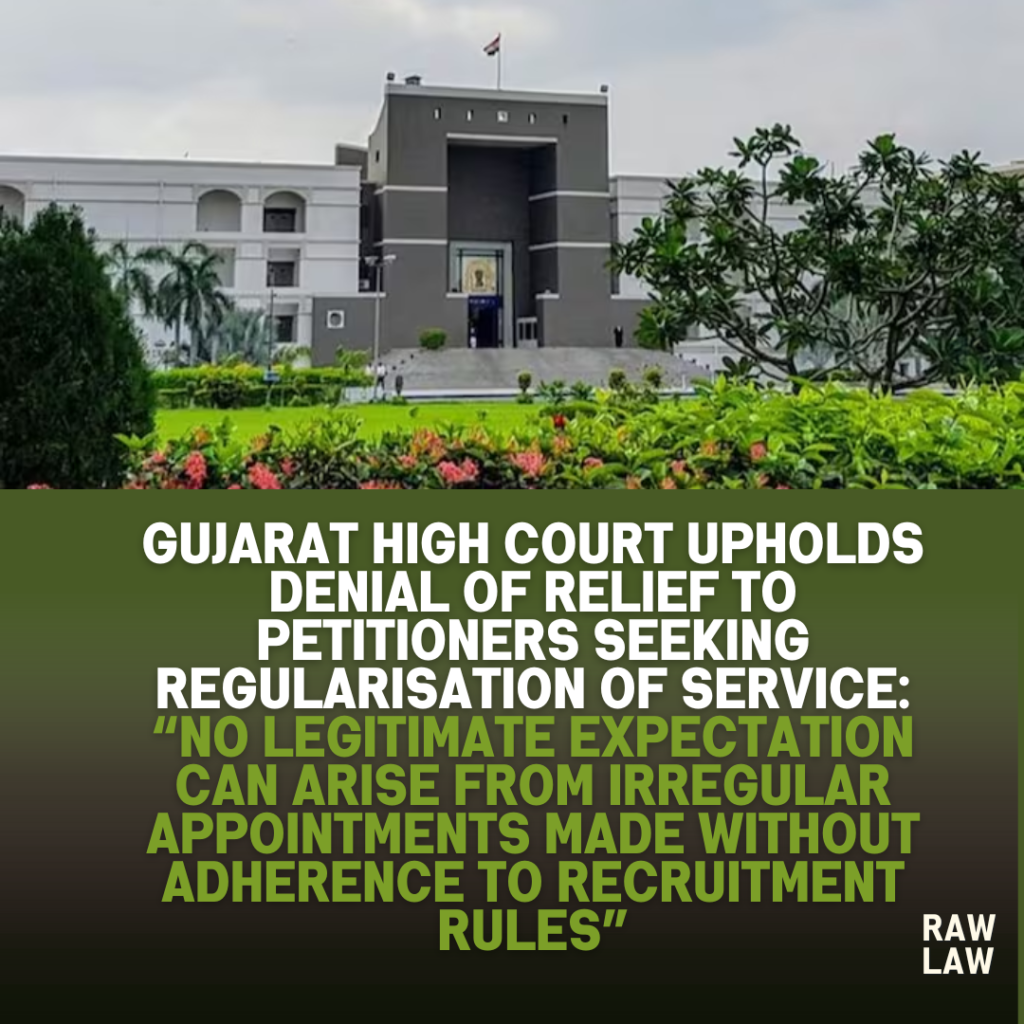Court’s Decision
The Division Bench of the Gujarat High Court in Special Civil Application No. 22519 of 2019 dismissed the petition challenging the State Government’s decision dated 20.08.2019 to not regularise the services of the petitioners—Gram Mitras (village-level functionaries). The Court held that the petitioners had no legal or vested right to claim regularisation or permanent absorption into government service when their initial appointments were made without following proper recruitment procedures.
The Court concluded:
“There was no process undertaken for appointment by open advertisement… therefore, the appointments are not traceable to any selection process.”
Facts
The petitioners were engaged as Gram Mitras under the “e-Gram Vishwagram” project launched in 2008 by the Gujarat Government in collaboration with the Government of India. They were selected by village panchayats and appointed as private service providers for facilitating digital communication services in villages.
They were paid a monthly honorarium and not governed by any specific government recruitment rules. Despite their contractual designation, the petitioners continued in service for over a decade. The government issued a resolution dated 20.08.2019 rejecting the demand for their absorption into permanent government service.
Aggrieved by this, the petitioners filed the present writ petition seeking a direction to regularise their services.
Issues
- Whether the petitioners had any legal right to claim regularisation or permanent status in government service.
- Whether long years of service or alleged “legitimate expectation” could entitle them to be absorbed permanently.
- Whether the government’s 2019 decision rejecting regularisation was arbitrary or violative of Article 14.
Petitioner’s Arguments
The petitioners contended that:
- They had been continuously serving for over 10 years without break, discharging important government functions at the grassroots.
- Their appointments, though made by Panchayats, were under the supervision and control of the State Government and therefore ought to be regularised.
- The concept of “legitimate expectation” applied given their long tenure, nature of duties performed, and lack of adverse remarks.
- Other similarly situated persons had allegedly been regularised, creating a case of discrimination.
- The denial of regularisation amounted to arbitrary action violating Articles 14 and 16 of the Constitution.
Respondent’s Arguments
The State Government and authorities argued that:
- The Gram Mitras were not appointed through any regular selection process, open advertisement, or under the recruitment rules of the State.
- Their engagement was on contractual basis through Panchayats and they were not government employees.
- The 20.08.2019 resolution rightly clarified that no absorption or regularisation could be granted since the appointments were irregular and without authority.
- The scheme under which they were appointed was specific in nature and had now been wound up.
- There could be no claim of legitimate expectation or discrimination when the petitioners’ very appointment was dehors the rules.
Analysis of the Law
The Court referred to the principle laid down in the Constitution Bench judgment of the Supreme Court in Secretary, State of Karnataka v. Uma Devi, (2006) 4 SCC 1, which categorically held:
“A claim based on legitimate expectation or long service cannot override the requirement of due process under Article 14 and established recruitment rules.”
The Court reiterated that irregular or illegal appointments made without following the due recruitment process cannot be the foundation for regularisation.
The Court also noted that no advertisement was issued, no competitive selection held, and the petitioners were appointed solely by local panchayats, bypassing all governmental recruitment norms.
Precedent Analysis
- Secretary, State of Karnataka v. Uma Devi, (2006) 4 SCC 1
– Applied in full. The Court reiterated that public employment must comply with the equality clause of Article 14. Irregular appointees cannot be regularised unless a one-time exception is made by the State in compliance with Uma Devi. - State of Gujarat v. PWD Employees Union, 2013 SCC OnLine Guj 747
– Cited to show that service under a State-sponsored scheme, even if continued for several years, does not ipso facto confer entitlement to regularisation. - State of Gujarat v. Barad Bachubhai Govindbhai, 2021 SCC OnLine SC 1240
– Referred to reiterate that courts cannot direct absorption in government service where appointments were made without compliance to statutory recruitment norms. - Union of India v. Ilmo Devi, (2023) 1 SCC 494
– Quoted to establish that contractual employees under schemes do not enjoy parity with regular employees nor can they demand equal pay or regularisation.
Court’s Reasoning
The Court held that:
- The petitioners were never selected through an open, transparent recruitment process. Their initial appointments were ad hoc and made by Panchayats, which had no authority to recruit for government posts.
- There was no legal infirmity in the 20.08.2019 decision of the State Government refusing regularisation.
- The concept of legitimate expectation cannot apply when the appointment itself was irregular or unauthorized.
- The plea of discrimination was rejected as petitioners failed to provide adequate materials showing parity with those allegedly regularised.
The Court emphasized:
“Public employment should be filled by a competitive process and absorption of those who entered through the backdoor would be unfair to others.”
Conclusion
The Gujarat High Court dismissed the writ petition and upheld the State Government’s policy decision not to regularise the services of Gram Mitras. It found that there was no enforceable legal right in favour of the petitioners and that the appointments were clearly irregular.
Implications
This ruling reinforces the constitutional principle that public employment must adhere to principles of fairness, equality, and adherence to recruitment rules. It sets a clear precedent that:
- Mere continuation of service does not create a right to regularisation.
- Legitimate expectation cannot be claimed when appointment is not sanctioned by law.
- Courts will not direct absorption into government service contrary to constitutional norms and statutory processes.
This judgment aligns with the broader judicial trend of curbing backdoor entries into public employment and fortifying the rule of law in public service recruitments.



